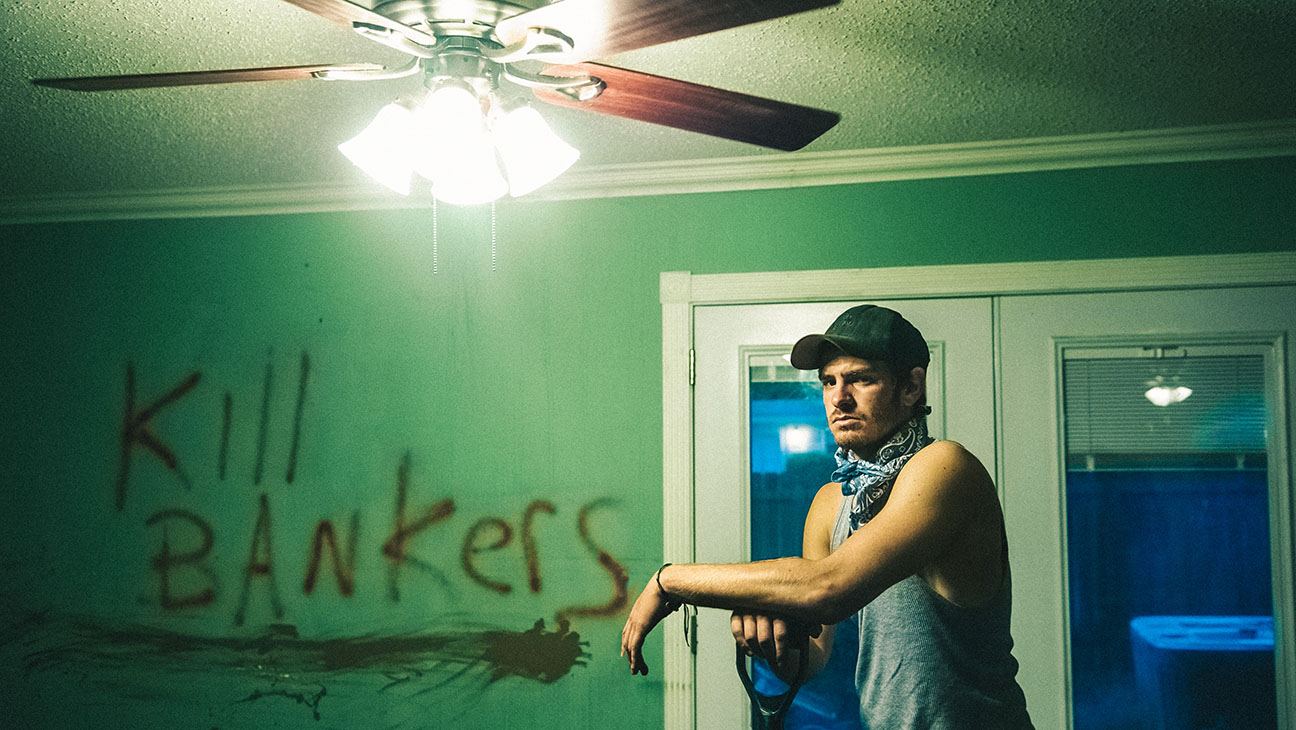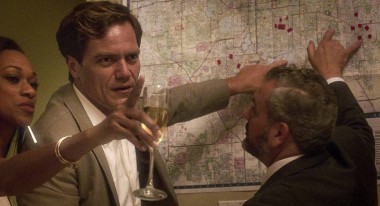 Back to selection
Back to selection
Roofless: Ramin Bahrani’s 99 Homes
 Andrew Garfield in 99 Homes
Andrew Garfield in 99 Homes “America doesn’t bail out losers,” real-estate-loophole master practitioner Rick Carver (Michael Shannon) tells victim-turned-protégé Dennis Nash (Andrew Garfield). “This nation is rigged for winners.” He proceeds to milk Noah’s ark for a metaphor. “I’m not going to drown.” With rapid visuals, pounding music, characters constantly in motion, montages of exploiters in action, and his usual astute observations of processes that enable the marring of innocents, Ramin Bahrani (Goodbye Solo, Chop Shop, Man Push Cart) impeccably dramatizes the reality behind this cynical point of view.
One that, as the the chasm between the 99% and the 1% widens, is especially valid for the subject he dissects so neatly and accessibly in 99 Homes: the multiple foreclosures during the subprime mortgage crisis that precipitated 2008’s global recession. Bahrani calls it a “thriller,” and the film certainly has some suspenseful scenes, but however you label it and, without diminishing its uniqueness, the most accurate tag is a kinship to Oliver Stone’s Wall Street.

Of Bahrani’s earlier works, 99 Homes rings closest to At Any Price, his first film without an immigrant at the center, in which the very American sense of competition becomes more skewed than it already is — between individuals and corporations and, more depressingly, between small-scale owners themselves. In both films, money is a distorted king — so that the topics fit snugly into his preoccupation with the plight of those marginalized in the U.S. by social and economic Darwinism, the descendants of last century’s Dust Bowlers.
The film is set in Orlando, Florida. Carver, a licensed real-estate broker who saw right away that there were bigger fish to fry than a conventional house sale, collaborated with banks and government officials— while screwing both — to rush through evictions by any means. The typical scenario: He appears at the front door with the sheriff and backup, presents a contrived legal document, tells the tenants that they must leave immediately (“This is the property of the bank now”), gives them a few minutes to collect a few items, and orders them curbside.
Even in cases like Nash’s, when a judge has given the resident a 30-day leeway, Carver comes the following day to execute the bank’s decision. (The courts are such a sham they are known as “rocket dockets.”) He gets away with this perversion of justice. Arguing for legal rights, sobbing, pleading — none of these responses pierce his thick skin. “Don’t get emotional about real estate,” he advises Nash later. “They’re boxes. What matters is how many you have.” After each eviction, a slovenly crew quickly empties the place and sets everything on the lawn, for a maximum of 24 hours. “It’s the law,” he explains to one suddenly ex-owner. All of this is played straight.

In the opening scene, Carver enters a home where the bloodied corpse of a suicide, who had been among the chosen earlier the same day, lies sprawled in the bedroom. The landlord is like ice. During a lengthy travelling shot, he starts walking while making an animated business call on his cell.
Later he arrives at the residence of Nash, a carpenter and jack-of-all-trades by profession, his mother, Lynn (Laura Dern, perfectly cast), and his nine-year-old son, Connor (Noah Lomax). With Nash, he has a very physical and formidable foe who refuses to budge until there is absolutely no way out. Like hundreds of others, the family ends up in a single room in a sleazy motel that caters to victims of foreclosure. This is not necessarily a temporary solution: One woman tells Lynn that she has been there for two years.
It’s a cliche that management often appropriates the smartest, most articulate union reps. When Nash confronts Carver on the lawn of some evictees who have intentionally backed up sewage to cover the place in shit before skipping town, the latter faces a dilemma. The workers refuse to enter. Nash is so desperate for money that he accepts his nemesis’s offer of cash to go in and start cleaning up. Gagging and vomiting, he begins. What impresses the opportunistic, manipulative Carver is how this young fellow who not long before had been screaming at him convinces the reluctant cleaners to join him. He recognizes a cash cow in the “loser” who has a family to take care of.
Over time Nash becomes Carver’s right-hand man. Ambivalent, yes, but he does begin to do the evictions himself. Given that this is Florida, guns and rifles make appearances. Garfield does a good job of moving between cold-heartedness and remorse, the latter manifest in his attempts to soothe the anxiety of those he has just displaced. In many ways the film is a tragedy about Nash’s struggle between conscience and actions. He stares at himself in the mirror for a long time, as if not recognizing the man who looks back. At one point he asks his boss, “Is it worth it?”
Enforcing does not fit in with his egalitarian principles. He tries to hide from the upstanding Lynn (“I bought my house fair and square!”) how he earns a sudden influx of money, and that he accompanies his chief to social events attended by local power brokers and sheisters. He swallows more than his pride: He chews up and spits out loving relationships. I’ll stop here: no spoilers.
We get little back story on the two principals. We find out Nash’s father was an alcoholic who never made good. Carver himself had been a nobody. Now he cheats on his wife with a mistress, whom he meets up with at the gauche parties. He is such a gifted schmoozer that it’s difficult to keep up with him. His mind and tongue work so fast and non-stop that no one can beat him in an argument, whether it’s with a hedge-fund manager, a politico, or an Everyman trying to live out the American Dream, keeping a roof over his head.
Although Garfield does a superb job, frequently thrashing about, this is Shannon’s show. (Bahrani allowed both performers space for improvisation.) He could have portrayed Carver as merely a two-dimensional, nouveau-riche hard-ass. Yet this finest of contemporary American actors broadens the character and his actions, sometimes with the tiniest of facial grimaces and the most subtle of body gestures. Carver schemes in a number of other ways, such as billing the government for equipment he has his crew take from the empty houses, then paying the men off to claim ownership of the properties. Rick Carver Realty could be its own circle of hell. The man is almost admirable, bordering on likable, in his nastiness: He has the county commissioner and the police department in his pocket, and has so fooled the local paper that they title his profile “Cleaning Up Communities.”
Veteran Iranian expat filmmaker Amir Naderi wrote this model screenplay with Bahrani and Bahareh Azimi. Bahrani has a natural feel for the flavor of the South (and this part of Florida is Deep South, no matter what anybody claims). He was born in North Carolina and lived there well past the time he was knee-high to a tadpole. Bobby Bukowski’s cinematography, much of it handheld, makes the facades of the lower-middle class homes and nearby strip malls appealingly colorful. (Bahrani’s aesthetic is hard to pin down: stylized realism?) Anthony Partos and Matteo Zingales’s score slips easily between the powerful percussion that accompanies most of the film’s constant movement, some lower-volume, softer sections, and occasional eastern melodies. 99 Homes is deceptively complex: It has more features than Disneyworld.

